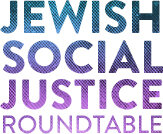
Racial Justice
Working on social justice issues today requires self-awareness and skills to navigate dynamics related to white privilege, racism, paternalism/sexism, antisemitism, Israel-Palestine, and more. The Roundtable approaches this work by putting relationship before task; grounding in Jewish tradition and values; and using community gatherings and support as core strengths. The goal of the racial justice work is to develop the capacities of staff at Roundtable organizations to embed racial equity practices.
The Roundtable offers in-person and virtual trainings for affiliated organizations to learn about racial justice and what it means to be racially/ethnically diverse, inclusive, equitable, and just organizations. We provide frameworks, tools, and relationships in an environment of curiosity, compassion, and challenge. We also invest in Jews of Color (JOC) who are on staff at our organizations by offering the programs listed below, building and developing organizational relationships, and prioritizing JOC participation in trainings. These are examples of ways we have done this:
The Racial Justice Framework and Guiding Principles created in 2019 by April Baskin, our Racial Justice Advisor, grounds racial justice work in Jewish values and provides a framework to understand Jewish racial justice work.
In 2020, the Roundtable awarded nearly $100,000 in matching grants to 21 affiliates for projects that address racism and promote racial equity. The grants helped to embed practices of racial equity in organizational systems and cultures and to honor and support the multiracial realities of the US Jewish community.
The Roundtable supports our organizations’ racial justice work through caucus/affinity group gatherings. These groups provide spaces for people to work within their own racial/ethnic groups and provide professional development and peer support.
The Roundtable regularly convenes staff at our affiliated organizations who are Jews of Color and People of Color in programmatic or executive roles, in order to support and learn from each other in navigating racism in the US context.
The Roundtable provides 1-1 mentoring support for Jews of Color who are on staff in our organizations, through a program that recruits and supports longtime JOC leaders in the Jewish community to provide that mentorship.
All affiliate organizations are required to be engaged in internal racial equity work and report what they are doing each year as part of the process to recommit to being part of the Roundtable for another year.
The Roundtable regularly convenes a virtual, multiracial Racial Justice Community of Practice of staff from 35 organizations engaged in transformative racial justice journeys. This community is a place to share learnings, ask questions, and stay energized to continue the work.
The Roundtable is governed by procedures that strive to embody our strategy and values. We are governed by the Leadership Team (LT), whose members are chosen according to these criteria:
Be executive staff, senior program staff, or board members of affiliated organizations
Be able to strategize on behalf of the entire network
At least 25% of the LT members are required to be Jews of Color/Sephardi/Mizrahi Jews, and at least half of that number are people targeted by racism in the U.S
At least half of the LT members must be either Jews of Color/Sephardi/Mizrahi Jews or white Jews who have a track record of racial equity experience.
We acknowledge the possible tokenizing dynamic that may occur and strive to counteract that by surpassing these minimum requirements and through continued cultivation of strong relationships among the team.
In addition, the Roundtable requires that Member organizations have an explicit commitment to actively pursuing racial justice by participating in racial/ethnic diversity, inclusion, equity, and justice work as defined by the Roundtable Racial Justice Framework. We encourage our Partner organizations to make this commitment as well.
Please check out our Racial Justice resource page for more materials.
